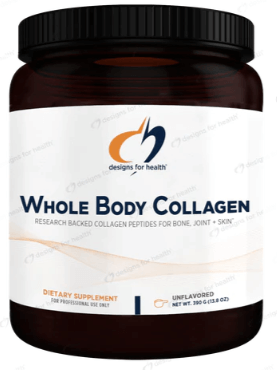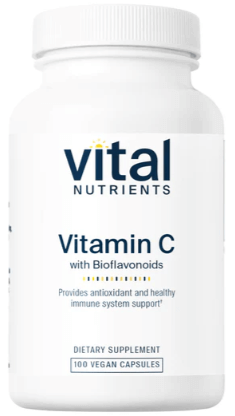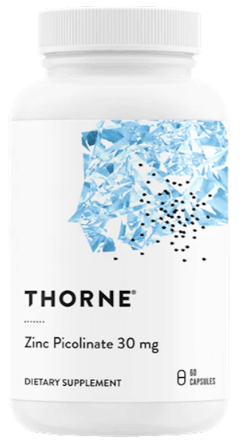Supplements for Clear Skin
Having clear skin shouldn’t feel like an ongoing struggle, but for many people it does. Whether it’s acne, redness, dry patches, or all of the above, finding a solution can feel downright frustrating. Here at Curated Wellness we’re all about taking the guesswork out of health, and we wanted to do the same for healthy skin. Ready to reach your best skin yet? Keep reading to learn more about our favorite clear skin supplements.
Before we consider what supplements are best for supporting clear skin, it’s important to identify exactly what kind of skin issues you are experiencing so that you can create the best plan for yourself. For example, some individuals may struggle with acne while others struggle with dryness or uneven skin tone. Truly understanding your unique skin type and needs is important for choosing the right supplements for you. Just like many aspects of health, what your skin needs is bioindividual and many require a bit of detective work on your end. Now that we’ve gotten that out of the way, let’s dive deeper into steps you can take to achieve your clearest skin yet.
Evaluate your lifestyle
The first step in creating clear skin is to evaluate your current lifestyle. Although there are many products and supplements that are useful in creating clear skin, it’s important to also address other potential lifestyle factors that can play a big role in skin health. Let’s take a closer look at three specific lifestyle factors that impact your skin.
The first thing to consider when it comes to lifestyle and skin health is whether you are drinking enough water. Every cell in our body needs water to function efficiently, and many people underestimate the significant role adequate hydration plays in achieving clear, glowing skin. The skin is our largest organ and our first line of protection against many environmental factors, and as a result may easily show wear and tear when it is not getting the proper nutrients it needs. Water not only keeps you hydrated but has many other roles that play a role in keeping your skin healthy, clear, and full of life. These include flushing out toxins that can lead to clogged pores, reduction of wrinkles, less dry skin, and smaller bags under your eyes. The amount of water you drink each day depends on many factors like activity level, age, height, weight, consumption of diuretics, and metabolism. However, as a general rule of thumb individuals should aim for about ½ of their body weight in ounces of water per day and then adjust from there based on how they feel. To get the most out of your water, consider adding electrolytes to one of your glasses.
Next, it is important to take a critical look at your current diet. Eating a nutrient dense diet is important for your entire body, which includes your skin. Topical skin care products are great but prioritizing a variety of foods that are rich in antioxidants, vitamins, minerals, and healthy fats is essential for maintaining clear, balanced, and glowing skin. Afterall, health starts from within and skin health is no different! Our skin is constantly shedding and replacing skin cells and thus requires a substantial amount of nutrients to support its continuous, rapid growth.
Foods to eat that are beneficial for skin health include:
- Foods high in healthy fats - fatty fish like wild-caught salmon, sardines, mackerel, and herring, avocados, grass-fed butter or ghee, nuts, and seeds.
- Vitamin E rich foods - Almonds, avocados, pine nuts, sunflower seeds, and hazelnuts.
- Vitamin C rich foods - Citrus fruits, blueberries, broccoli, strawberries, and papaya
- Zinc rich foods - wild caught fish, grass-fed meats, free-range poultry, shellfish, nuts, and seeds.
Not only is it important to focus on the skin-boosting foods we should eat more of, but we also need to consider potential troublesome foods that would be beneficial to limit as they can negatively impact skin health.
Common trigger foods include:
- Poor quality dairy products
- Heavily processed foods
- Sugary foods and pastries
- Processed oils like canola oil or margarine
- Egg whites
- Poor quality gluten
Finally, for optimal skin health it is important to also consider the impact that stress has on skin health. Stress, specifically chronic stress, increases inflammatory compounds throughout the body which can lead to a host of skin issues. For example, acne is a common inflammatory skin condition that many struggle with and research has even found correlations between strong feelings of emotional stress and acne severity. For this reason it is important to find consistent ways to reduce stress to support skin health. Some of the best ways to do this include:
- Getting regular exercise
- Meditation or deep breathing
- Yoga
- Spending time outside in nature
- Cooking or baking
- Engaging in a favorite hobby
Choose the right supplements
There are many supplements out there that claim to support skin health, most with little science to back up their claims. As a result, knowing what to take and where to start often feels discouraging and overwhelming. Thankfully, it doesn’t have to! To achieve your clearest skin yet, there are a few supplements you might consider that tend to be beneficial for many people hoping to solve their skin issues.
Collagen is the most abundant protein present in the human body, and is most readily found in the skin, muscles, bones, and tendons. It acts as the "glue” that holds and supports the body, providing plenty of strength and structure. Because it is so present throughout the body, it has become an increasingly popular supplement for those looking for smoother, clearer, and more youthful skin. It can be found in many beauty and skincare products, and we can’t help but agree that it is a wonderful supplement for supporting skin health.
For starters, regular collagen supplementation, especially when combined with healthy diet and lifestyle choices, may help to reduce the appearance of wrinkles and fine lines due to improvements in skin elasticity and overall skin appearance. Additionally, collagen may also improve the smoothness of the skin, increase moisture, and decrease dryness, making it a great addition to your skin supporting supplement regime!
Looking for a good quality collagen supplement? Check out our latest blog The Best Collagen Peptides Supplements for a more detailed breakdown of what collagen is, and some of our favorite collagen products we think you should try.
Vitamin C is well known for its immune-supporting properties, but did you know that it’s actually really important for skin health as well? In fact, it’s actually a fairly common ingredient added to many anti-aging skincare products. It is present in high levels throughout the inner and outer layers of the skin and is constantly in high demand as old cells are sloughed off and new ones are created. Vitamin C is also required for adequate production of collagen (the nutrient we know is essential for skin elasticity), and functions as an antioxidant by reducing oxidative stress and damage. Additionally, oral consumption of vitamin C may also boost the effectiveness of sunscreens and may even help prevent and repair dry skin.
Although a true vitamin C deficiency is rare, it is still important that you consider whether you are getting enough good quality vitamin C daily (whether it’s through whole foods sources or supplements). Vitamin C is a water-soluble vitamin and thus is not stored in the body, meaning daily consumption is really important! Thankfully, it’s very easy to get enough of this important vitamin from a variety of sources. Some of the best food sources of vitamin C include:
- Citrus foods like oranges, kiwis, and mangos
- Bell peppers
- Strawberries
- Broccoli
- Spinach
Another way to ensure you get plenty of vitamin C is by regularly taking a vitamin C supplement that also includes bioflavonoids for optimal absorption.
Zinc is an essential mineral that is important for many bodily functions. It is well known for its role in strengthening the immune system, decreasing wound healing time, DNA and protein synthesis, cognitive function, and healthy child development. On top of all of that, it is also an important nutrient for supporting clear and healthy skin.
Zinc is important for all layers of the skin but is especially important for the outermost layer. This outside layer contains more zinc than all other layers of the skin, which is likely why topical skincare products that contain zinc oxide are often so successful in clearing up the skin. We know that the skin is constantly shedding old skin cells and replacing them with new ones, and adequate levels of zinc are important for supporting this process. In addition to skincare products, zinc oxide is often found in natural sunscreen products as it is extremely effective in deflecting harmful UV rays from the sun and protecting the skin from sun damage.Finally, zinc is an important cofactor for collagen synthesis and DNA repair, and thus is important for keeping the skin looking healthy and youthful.
Zinc is not stored in the body for long so daily consumption is important for overall health, whether through food or supplement sources. If you’re looking for food-based sources of zinc, try rotating the following through your daily diet:
- Oysters
- Crab
- Grass-fed meat
- Legumes
- Hemp seeds
- Cashews
- Raw dairy products
Omega-3 fatty acids are a type of fatty acid that is required for optimal health, and that our body is unable to produce on its own. They have many benefits that reach far beyond skin health like inflammation reduction, protection against heart disease, mood boosting effects, and cognitive clarity. One of their lesser known benefits, however, is their ability to support clear and healthy skin and hair in a variety of ways.
For starters, omega-3 fatty acids may help to prevent and/or reduce the severity of acne by reducing inflammation. Recent research suggests that acne is potentially caused by inflammation, and thus reducing inflammation is essential for reaching clear skin. Additionally, it is possible that supplementing with omega-3s in addition to other nutrients might decrease the severity of acne lesions, though individual effects vary.
Additionally, adequate amounts of omega-3s are thought to help moisturize the skin, and decrease red, itchy, and dry skin often due to skin conditions like psoriasis, dermatitis, and eczema. This may be due to omega-3s ability to both support the skin strength and integrity, while sealing in moisture.
Finally, omega-3s may protect the skin from the sun’s harmful ultraviolet A and ultraviolet B rays. Regularly consuming food or a supplement that includes a combination of both EPA and DHA can reduce skin sensitivity and increase resistance to sunburns.
Although there are many foods that are rich in omega-3 fatty acids, many people struggle to consume enough of these important fatty acids. Some of our favorite rich food sources include:
- Sockeye salmon
- Sardines
- Mackerel
- Herring
- Walnuts
- Ground flax seeds
- Chia seeds
Achieving clear skin requires a holistic approach that not only includes choosing the right supplements but adjusting your diet and lifestyle as well. There’s a lot to it, but thankfully you don’t have to do it alone! If you’re looking for more individualized support in addressing all pieces of the puzzle our trained, holistic practitioners are here to help! When you work with a practitioner you can rest assured that you are choosing not only the best quality supplements, but the ones that your body actually needs to reach your clear skin goals.
About the author.
Emily Alexander, M.Ed., FNTP—Emily is a Nutritional Therapy Practitioner with Curated Wellness. She is passionate about supporting others in their journey to improve their relationship with food and their body through gentle nutrition, and is a firm believer that understanding the bio-individual components of nutrition is one of the best ways to do so. Emily completed her Master’s of education in health education and promotion with a concentration in eating disorders, and draws from both her educational background and life experience to help her clients improve their energy, understand their bodies, boost their athletic potential, and break down diet myths one at a time. Read more about Emily.
The information presented on this website is intended for educational purposes only. Statements within this site have not been evaluated or approved by the Food and Drug Administration. This content is not intended to diagnose, treat, cure, or prevent any specific condition or disease, nor is it medical advice and should not be considered a substitute for professional medical expertise. Readers of this content are advised to consult their doctors or qualified health professionals regarding specific health conditions or concerns. One should always consult a qualified medical professional before engaging in any dietary and/or lifestyle change or new health program. Curated Wellness does not take responsibility for any health consequences of any person or persons following the information in this educational content.
REFERENCES
- Palma, L., Marques, L. T., Bujan, J., & Rodrigues, L. M. (2015). Dietary water affects human skin hydration and biomechanics. Clinical, cosmetic and investigational dermatology, https://doi.org/10.2147/CCID.S86822.
- https://link.springer.com/chapter/10.1007/978-3-642-12264-4_9
- https://link.springer.com/chapter/10.1007/978-3-642-12264-4_9
- Evans, J. A., & Johnson, E. J. (2010). The role of phytonutrients in skin health. Nutrients, 2(8), 903–928. https://doi.org/10.3390/nu2080903.
- Cosgrove, M. C., Franco, O. H., Granger, S. P., Murray, P. G., & Mayes, A. E. (2007). Dietary nutrient intakes and skin-aging appearance among middle-aged American women. The American journal of clinical nutrition, 86(4), 1225–1231. https://doi.org/10.1093/ajcn/86.4.1225.
- Institute of Medicine. Food and Nutrition Board. Dietary Reference Intakes for Vitamin A, Vitamin K, Arsenic, Boron, Chromium, Copper, Iodine, Iron, Manganese, Molybdenum, Nickel, Silicon, Vanadium, and Zinc: a Report of the Panel on Micronutrients. Washington, DC: National Academy Press; 2001. https://www.ncbi.nlm.nih.gov/books/NBK222317/ Accessed 10/17/2019.
- Tan, J., Stein Gold, L. F., Alexis, A. F., & Harper, J. C. (2018). Current Concepts in Acne Pathogenesis: Pathways to Inflammation. Seminars in cutaneous medicine and surgery, 37(3S). https://doi.org/10.12788/j.sder.2018.024.
- https://jamanetwork.com/journals/jamadermatology/fullarticle/479409
- Proksch, E., Segger, D., Degwert, J., Schunck, M., Zague, V., & Oesser, S. (2014). Oral supplementation of specific collagen Peptides has beneficial effects on human skin physiology: a double-blind, placebo-controlled study. Skin pharmacology and physiology, 27(1), 47–55. https://doi.org/10.1159/000351376
- DePhillipo, N. N., Aman, Z. S., Kennedy, M. I., Begley, J. P., Moatshe, G., & LaPrade, R. F. (2018). Efficacy of Vitamin C Supplementation on Collagen Synthesis and Oxidative Stress After Musculoskeletal Injuries: A Systematic Review. Orthopaedic journal of sports medicine, 6(10), 2325967118804544. https://doi.org/10.1177/2325967118804544
- https://www.healthline.com/health/skin/zinc-oxide-sunscreen#zinc-oxide-and-titanium-dioxide
- Tengrup, I., Ahonen, J., & Zederfeldt, B. (1981). Influence of zinc on synthesis and the accumulation of collagen in early granulation tissue. Surgery, gynecology & obstetrics, 152(3),
- Khayef, G., Young, J., Burns-Whitmore, B., & Spalding, T. (2012). Effects of fish oil supplementation on inflammatory acne. Lipids in health and disease, 11, 165. https://doi.org/10.1186/1476-511X-11-165
- Jung, J. Y., Kwon, H. H., Hong, J. S., Yoon, J. Y., Park, M. S., Jang, M. Y., & Suh, D. H. (2014). Effect of dietary supplementation with omega-3 fatty acid and gamma-linolenic acid on acne vulgaris: a randomised, double-blind, controlled trial. Acta dermato-venereologica, 94(5), 521–525. https://doi.org/10.2340/00015555-1802
- Kawamura, A., Ooyama, K., Kojima, K., Kachi, H., Abe, T., Amano, K., & Aoyama, T. (2011). Dietary supplementation of gamma-linolenic acid improves skin parameters in subjects with dry skin and mild atopic dermatitis. Journal of oleo science, 60(12), 597–607. https://doi.org/10.5650/jos.60.597
- Rhodes, L. E., Shahbakhti, H., Azurdia, R. M., Moison, R. M., Steenwinkel, M. J., Homburg, M. I., Dean, M. P., McArdle, F., Beijersbergen van Henegouwen, G. M., Epe, B., & Vink, A. A. (2003). Effect of eicosapentaenoic acid, an omega-3 polyunsaturated fatty acid, on UVR-related cancer risk in humans. An assessment of early genotoxic markers. Carcinogenesis, 24(5), 919–925. https://doi.org/10.1093/carcin/bgg038











